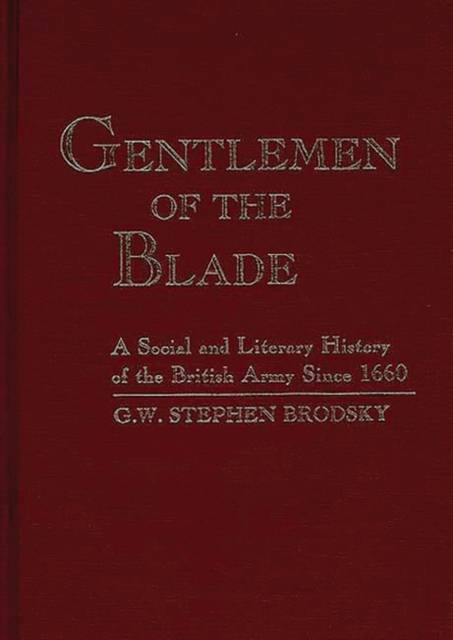
- Afhalen na 1 uur in een winkel met voorraad
- Gratis thuislevering in België vanaf € 30
- Ruim aanbod met 7 miljoen producten
- Afhalen na 1 uur in een winkel met voorraad
- Gratis thuislevering in België vanaf € 30
- Ruim aanbod met 7 miljoen producten
Zoeken
Gentlemen of the Blade
A Social and Literary History of the British Army Since 1660
G W Stephen Brodsky
€ 161,45
+ 322 punten
Omschrijving
Brodsky contends that three factors--constitutional, commercial, and technological--in turn, have caused Britain to raise large citizen forces. Because Britain traditionally has been an unmilitary state which has not maintained large standing armies, this ethos of amateurism merged with the professionalism of the Regular Army. He argues that it is this unique influence of amateurism which historically has been central to the British profession of arms and vital to its spirit of service. A wide range of prose and poetry illustrates that spirit and the military cultural experience in which it evolved in Great Britain from the Restoration through World War II. In an overview of later developments, including the Falklands War, Brodsky enunciates the challenge facing the traditional ethos in the nuclear age. Analyzing the effect of the literary idiom, he questions the future direction of representative literature.
Specificaties
Betrokkenen
- Auteur(s):
- Uitgeverij:
Inhoud
- Aantal bladzijden:
- 224
- Taal:
- Engels
- Reeks:
Eigenschappen
- Productcode (EAN):
- 9780313260674
- Verschijningsdatum:
- 11/03/1988
- Uitvoering:
- Hardcover
- Formaat:
- Genaaid
- Afmetingen:
- 156 mm x 234 mm
- Gewicht:
- 489 g

Alleen bij Standaard Boekhandel
+ 322 punten op je klantenkaart van Standaard Boekhandel
Beoordelingen
We publiceren alleen reviews die voldoen aan de voorwaarden voor reviews. Bekijk onze voorwaarden voor reviews.











